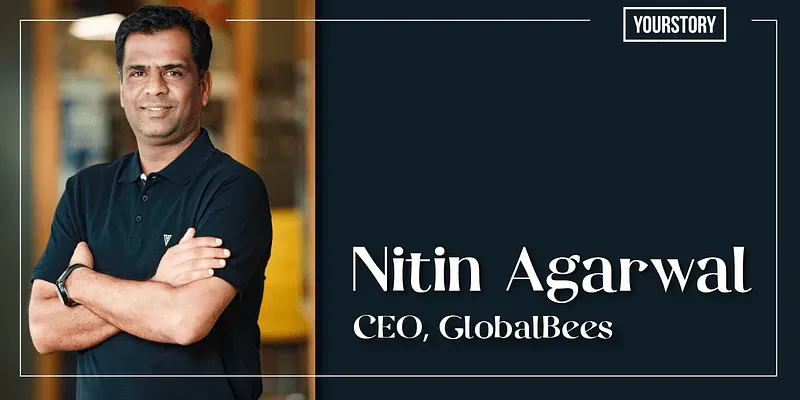[The Turning Point] How rollup ecommerce unicorn GlobalBees was started to help entrepreneurs scale their D2C brands
The Turning Point is a series of short articles that focusses on the moment when an entrepreneur hit upon their winning idea. This week, we look at GlobalBees, which turned unicorn in less than a year since its inception in May 2021.
Rollup ecommerce startup , which is based on the Thrasio model, was founded in May 2021 by FirstCry founder Supam Maheshwari and Edelweiss’ former President and Group Chief Investment Officer Nitin Agarwal.
The startup acquires digital-first brands across categories such as beauty, nutrition, food, fitness, personal care, lifestyle, home, sports and lifestyle, which have a revenue rate of $1 million to $20 million, and help them scale up and grow.
In December last year, GlobalBees made it to the unicorn list, in just seven months since its inception.
How was it started?
In the last few years, a lot of ecommerce brands have come up in India, owing to the evolution of the ecosystem with better logistics, deeper internet penetration, and increased consumer interest and trust.
A lot of these were direct-to-consumer (d2c) brands that were able to blossom due to the presence of platforms like Amazon, Flipkart, and Shopify.
“We realised that the founders found it difficult to manage everything simultaneously, including logistics and technology,” Damandeep Singh Soni, Chief Business Office, GlobalBees, told YourStory.
Many of these brands hit a threshold, after which it becomes difficult for them to scale, which was the problem statement GlobalBees started with.

This is something GlobalBees team had seen in other developed ecommerce ecosystems. “We had the luxury of looking at other countries to see how the ecosystem evolved and grew, ” Damandeep says.
“This is when we came up with the idea of a rollup ecommerce model where we could bring in all the expertise together and help the D2C brands scale what they had built,” he adds.
In a previous interaction with YourStory, Nitin said that most of these brands have ambitions of building the product and focus on innovation. But in reality, they end up spending 95 percent of their time on other technical operations and management such as building the tech, logistics, CoD, reconciliation, listing, vendor agreements, and so on.
This is where companies like GlobalBees are helping by taking over those services and providing an enterprise ecosystem to scale the brand.
“They (brands) are passionate about the product, they know the category, and really want to spend time on that. So it’s a win-win for both GlobalBees and entrepreneurs to be able to realise that full potential,” Nitin had said.
GlobalBees acquires and partners with sellers on Amazon and equips them with capabilities across marketing and growth, technology, distribution, sourcing, branding, warehousing, logistics, R&D, product development, and operations — all things essential to rapidly scale the brands in the digital space.
The journey
New-Delhi-based GlobalBees raised $150 million in Series A in a mix of equity and debt led by FirstCry and some of its investors, with additional participation from Lightspeed Venture Partners. This was one of the largest Series A rounds raised by an Indian startup.
Since then, it has acquired 12 brands across categories, including The Better Home, andMe, Prolixr, Absorbia, Yellow Chimes, HealthyHey, and others.
While investing in brands, GlobalBees looks for a variety of things in the sellers. It looks at their global appeal, ecommerce friendliness, unit economics and levers of growth. Positive customer reviews and having repeatable consumers is also something that helps them grow.
Presently, the company’s strategy is to work with these and building them up, says Damandeep.
“They have done their 0 to 1 journey, we have to take them to 1 to 100,” he says. This means helping the brands build communities and helping them communicate their story, besides their supply chain and logistics.
In the next three years, the startup is targeting a revenue of billion dollars, with plans to invest in 100 brands across verticals, including fast-moving consumer goods (FMCG), sports, home organisation, and lifestyle
For now, it is focusing on growing these brands and building their teams.
The market
The rollup ecommerce segment has received a lot of investor validation in the last year with new companies coming up in the space.
Apart from Mensa Brands, startups such as G.O.A.T Brand Labs, GlobalBees, Evenflow, Powerhouse91, UpScalio, and 10Club are building their own version of the ‘house of brand’ model to leverage the D2C opportunity in India.
The global brand Thrasio also announced its India entry in January with a purse size of Rs 3,750 crore.
“We are getting a lot of active inbound interest as well. Initially, there was a lot of scepticism around this model, in terms of getting opportunities and valuations that platforms will bring and so on. All of that is beginning to settle down and both — entrepreneurs and platforms — are beginning to understand each other,” Nitin had said in a previous interaction.
Edited by Megha Reddy


![[The Turning Point] How rollup ecommerce unicorn GlobalBees was started to help entrepreneurs scale their D2C brands](https://images.yourstory.com/cs/2/31ee0510ca7c11eba975c529dced399e/MalvikaCopyofImageTagging43-1646400855681.png?mode=crop&crop=faces&ar=2%3A1&format=auto&w=1920&q=75)

![[Funding alert] GlobalBees joins unicorn club with latest fundraise](https://images.yourstory.com/cs/2/a054f1302d6c11e9aa979329348d4c3e/FeatureImages-561-1630395757056.png?fm=png&auto=format&h=100&w=100&crop=entropy&fit=crop)

![[Funding alert] GlobalBees raises $150M in Series A to build a Thrasio-like house of brands](https://images.yourstory.com/cs/2/f02aced0d86311e98e0865c1f0fe59a2/funding-1625115361141.png?fm=png&auto=format&h=100&w=100&crop=entropy&fit=crop)